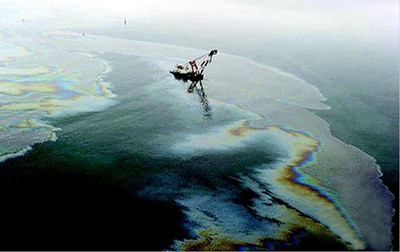Oil and water don't mix.
油与水不能混合。
Despite that age-old axiom, it sure is hard to get spilled petroleum out of seawater, as was evident during BP's blowout in the Gulf of Mexico.
尽管有这样古老的公理,也很难将泄漏的石油从海水中弄出来,而且英国石油公司在墨西哥湾一事确是证明了这一点。
But what if you could make oil magnetic?
但是如果你能让石油变得磁化会怎样呢?
That thought came to physicist Arden Warner while he watched coverage of the spill back in 2010.
这个想法来自于物理学家雅顿华纳,他是在2010年看过有关泄漏的报道后迸发出这样的灵感。
And it launched some garage tinkering for Warner, who by day works on improving particle accelerators at Fermilab.
于是白天在费米实验室进行粒子加速器的改进工作后,华纳晚上在车库中致力于自己的奇思妙想研究。
He shaved iron bits from a shovel and sprinkled them atop some engine oil.
他将铲子上的铁去除,在顶部撒上一些机油。

Lo and behold, a refrigerator magnet pulled the blob of oil wherever he wanted.
你瞧, 无论他去到那里,冰箱磁铁都可以将油滴剥离。
Now he's got a patent on the concept that he's refined over the past few years.
现在经过几年的改善他获得了这一理念的专利。
The Warner method requires only a relatively small amount of magnetic metal dust.
华纳的这种方法只需要相对少量的磁性金属粉末。
And the iron particles mix better with oil than with water, or with anything else the oil might get on, like bird feathers or plants.
而铁颗粒与油水相比混合,或者同其它石油可能的附着物,比如鸟的羽毛或植物等效果更好。
Another plus: once the oil is collected, the filings can be dried off and reused.
另一个好处是:一旦石油被收集起来,这些碎末可以变干并且再次循环利用。
And iron is more environmentally friendly than the chemicals currently used to disperse oil.
而且铁比目前在分散石油方面使用的化学品更为环保。
So maybe next time there's an oil spill—and there will be a next time—we can clean up the mess with magnets.
也许下次的石油泄露,肯定会有下一次,可以使用磁铁收拾残局。












